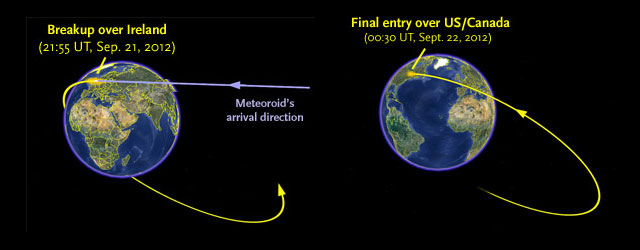The Boomerang Meteor
While driving a couple weeks ago, I happened to catch a meteor shooting across the sky:
Saw one of the coolest things ever tonight: a meteor burning up in the lower atmosphere. Super bright, exploded at the end like a firework.
It turned out that “one of the coolest things ever” wasn’t hyperbole. You see, earlier that day over the UK, a meteor streaked across the sky for about 50 seconds:
And then the one I saw happened about two-and-a-half hours later. Spurred by this unlikely coincidence, mathematician Esko Lyytinen of the colorfully named Finnish Fireball Working Group of the Ursa Astronomical Association did some calculations and determined that the two events were actually the same meteor.
He believes a large body grazed the upper atmosphere, dipping to an altitude of 33 miles (53 km) over Ireland before escaping back to space. Because it arrived moving at only about 8 miles (13 km) per second, barely above Earth’s escape velocity, it lingered for more than a minute as it crossed the sky. (This explains why some witnesses mistook it for reentering spacecraft debris.)
Lyytinen says the brief atmospheric passage took its toll. As the meteoroid broke apart, its velocity dropped to just 5.7 miles (9.2 km) per second, too slow to make an escape back to space. Instead, it became a temporary satellite of Earth, looping completely around the globe before reentering the atmosphere — this time for good. “It looks now that the fireball witnessed 155 minutes later in U.S. and Canada, may have been one fragment of the British fireball, most probably the biggest one,” Lyytinen explains.

These earth-grazers are not common but they do happen from time to time. But a visible Earth grazing meteor that enters the atmosphere twice? Unprecedented. So cool! (thx, alex)





Stay Connected